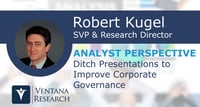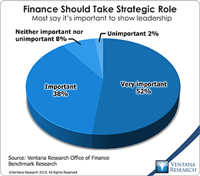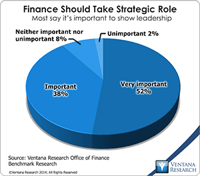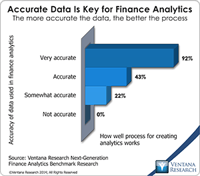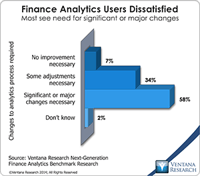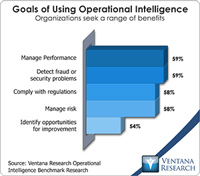The emphasis on environmental, social and governance (ESG) issues has been growing for some time. I participated in the development of the Sustainability Accounting Standards Board (SASB) as a software industry expert more than a decade ago. The rise of ESG’s profile in corporate reporting is the latest evolution of “responsible investing,” a topic that goes back centuries in the west. The modern era of responsible investing took form in the United States beginning in the 1960s and then...
Read More
Topics:
Governance,
Office of Finance,
Business Planning,
ERP and Continuous Accounting,
digital finance,
ESG,
Environmental
ESG reporting is a matter that organizations – and especially publicly held corporations – will be confronting over the next several years. Ventana Research asserts that by 2025, one-half of corporations with 1,000 or more employees will have a formal ESG reporting process in place to address legal mandates or shareholder demand. The roots of ESG investing go back many decades but it has gained significant attention recently as demand in the investment world for non-accounting measures to guide...
Read More
Topics:
FP&A,
Governance,
Office of Finance,
Reporting,
CFO,
ESG
SYSPRO is a 35-year-old software vendor that focuses on selling enterprise resource planning (ERP) systems to midsize companies, particularly those in manufacturing and distribution. In manufacturing, SYSPRO supports make, configure and assemble, engineer to order, make to stock and job shop environments. The company attempts to differentiate itself through vertical specialization and its years of ongoing development, which can reduce the need for customization and cut the cost of initial and...
Read More
Topics:
Big Data,
SaaS,
ERP,
Governance,
Human Capital Management,
Office of Finance,
close,
Continuous Accounting,
Analytics,
CIO,
Cloud Computing,
Collaboration,
CFO,
CRM,
CEO
The topic of corporate governance received renewed attention recently after the publication of an open letter signed by 13 prominent business leaders, including Warren Buffett of Berkshire Hathaway and Jamie Dimon of JPMorgan Chase. The first principle the group advocated in the letter is the need for a truly independent board of directors. To achieve that aim, the letter suggests having the board meet regularly without the CEO and that the members of the board should have “active and direct...
Read More
Topics:
Mobile,
Governance,
Human Capital Management,
Office of Finance,
Consolidation,
Reconciliation,
CFO,
CEO,
board of directors,
accounting close
The imperative to transform the finance department to function in a more strategic, forward-looking and action-oriented fashion has been a consistent theme of practitioners, consultants and business journalists for two decades. In all that time, however, most finance and accounting departments have not changed much. In our benchmark research on the Office of Finance, nine out of 10 participants said that it’s important or very important for finance departments totake a strategic role in running...
Read More
Topics:
Big Data,
Planning,
Predictive Analytics,
Social Media,
Governance,
GRC,
Mobile Technology,
Office of Finance,
Budgeting,
close,
Continuous Accounting,
Continuous Planning,
end-to-end,
Human Capital,
Tax,
Analytics,
Business Analytics,
Business Collaboration,
CIO,
Cloud Computing,
In-memory,
Uncategorized,
Business Performance Management (BPM),
CFO,
CPQ,
Financial Performance Management (FPM),
Risk,
CEO,
Financial Performance Management,
FPM
Last year Ventana Research released our Office of Finance benchmark research. One of the objectives of the project was to assess organizations’ progress in achieving “finance transformation.” This term denotes shifting the focus of CFOs and finance departments from transaction processing toward more strategic, higher-value functions. In the research nine out of 10 participants said that it’s important or very important for the department to take a more strategic role. This objective is both...
Read More
Topics:
Big Data,
Planning,
Predictive Analytics,
Governance,
GRC,
Office of Finance,
Budgeting,
close,
end-to-end,
Tax,
Tax-Datawarehouse,
Analytics,
CIO,
In-memory,
Business Performance Management (BPM),
CFO,
CPQ,
Financial Performance Management (FPM),
Risk,
CEO,
Financial Performance Management,
FPM
Our research consistently finds that data issues are a root cause of many problems encountered by modern corporations. One of the main causes of bad data is a lack of data stewardship – too often, nobody is responsible for taking care of data. Fixing inaccurate data is tedious, but creating IT environments that build quality into data is far from glamorous, so these sorts of projects are rarely demanded and funded. The magnitude of the problem grows with the company: Big companies have more...
Read More
Topics:
Big Data,
Planning,
Predictive Analytics,
Governance,
Office of Finance,
Operational Performance Management (OPM),
Budgeting,
close,
Finance Analytics,
Tax,
Analytics,
Business Analytics,
Business Intelligence,
CIO,
Governance, Risk & Compliance (GRC),
In-memory,
Business Performance Management (BPM),
CFO,
Financial Performance Management (FPM),
Information Applications (IA),
Risk,
Workforce Performance Management (WPM),
CEO,
Financial Performance Management,
FPM
Business computing has undergone a quiet revolution over the past two decades. As a result of having added, one-by-one, applications that automate all sorts of business processes, organizations now collect data from a wider and deeper array of sources than ever before. Advances in the tools for analyzing and reporting the data from such systems have made it possible to assess financial performance, process quality, operational status, risk and even governance and compliance in every aspect of a...
Read More
Topics:
Big Data,
Planning,
Predictive Analytics,
Governance,
Office of Finance,
Budgeting,
close,
Finance Analytics,
Tax,
Analytics,
Business Analytics,
Business Intelligence,
CIO,
Governance, Risk & Compliance (GRC),
In-memory,
Business Performance Management (BPM),
CFO,
Financial Performance Management (FPM),
Information Management (IM),
Risk,
CEO,
Financial Performance Management,
FPM
Senior finance executives and finance organizations that want to improve their performance must recognize that technology is a key tool for doing high-quality work. To test this premise, imagine how smoothly your company would operate if all of its finance and administrative software and hardware were 25 years old. In almost all cases the company wouldn’t be able to compete at all or would be at a substantial disadvantage. Having the latest technology isn’t always necessary, but even though...
Read More
Topics:
Big Data,
Planning,
Predictive Analytics,
Governance,
GRC,
Office of Finance,
Budgeting,
close,
Tax,
Analytics,
Business Analytics,
Business Collaboration,
CIO,
Cloud Computing,
Governance, Risk & Compliance (GRC),
In-memory,
Business Performance Management (BPM),
CFO,
Financial Performance Management (FPM),
Risk,
CEO,
Financial Performance Management,
FPM
All the hubbub around big data and analytics has many senior finance executives wondering what the big deal is and what they should do about it. It can be especially confusing because much of what’s covered and discussed on this topic is geared toward technologists and others working outside of Finance, in areas such as sales, marketing and risk management. But finance executives need to position their organization to harness this technology to support the strategic goals of their company. To...
Read More
Topics:
Big Data,
Performance Management,
Predictive Analytics,
Customer Experience,
Fraud,
Governance,
GRC,
Office of Finance,
audit,
Controller,
Analytics,
Business Analytics,
Cloud Computing,
Governance, Risk & Compliance (GRC),
Operational Intelligence,
Business Performance Management (BPM),
CFO,
compliance,
finance,
Financial Performance Management (FPM),
Information Management (IM),
Risk,
Financial Performance Management,
financial risk management




